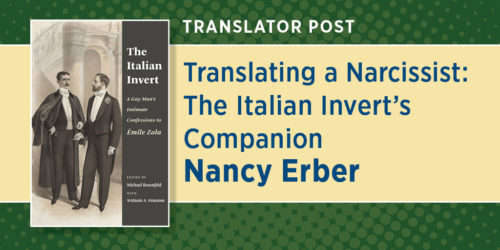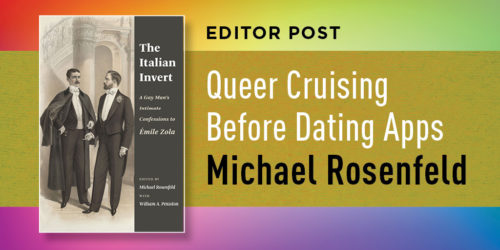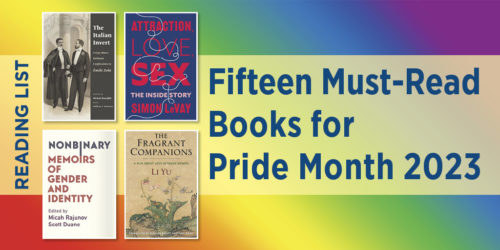A Voice from the Past One Nineteenth-Century Queer Autobiography William A. Peniston
William A. Peniston

Before the twentieth century, it is rare to find autobiographical writings by men who were attracted to other men. In France, only eight have been identified for the era between 1845 and 1905. All were originally published in French as case studies in medical journals; none of them were completely unmediated personal expressions; and yet, despite their disparate origins, they demonstrated eloquently the modern conviction that individual lives are worth telling—and are still worth reading—because of their unique sensibilities.
One of these queer autobiographies was first published under the ironic title The Novel of an Invert in 1896, and a follow-up letter was published in 1910. Both pieces were heavily censored by the medical doctor who included them as a case study in his book on “sexual perversions.” Today, due to some remarkable archival discoveries, the first complete, unexpurgated version in English has been published under the title, The Italian Invert: A Gay Man’s Intimate Confessions to Émile Zola.
Written by a dashing young Italian aristocrat (who thought that his life story would make an interesting subject for one of Zola’s novels), it is an astonishing confession. The young man frankly describes in a series of revealing letters his sexual experiences with other men, as well as his “extraordinary” personality. Judging it too controversial, Zola gave the letters to Dr. Georges Saint-Paul, who published it in a medical treatise. When the Italian came across this book, he was shocked to discover how his life story had been distorted. In protest, he wrote a long, daring, and unapologetic letter to the doctor defending his right to love and to live as he wished. To quote: “Each of us has his tastes inscribed in his brain and heart; whether he fulfills his urges with regret or with joy, he must fulfill them. He should let others act according to their own nature. It’s fate that creates us and guides us throughout our lives: to fight against it would be little more than fruitless, foolish, and reckless!”
“Each of us has his tastes inscribed in his brain and heart; whether he fulfills his urges with regret or with joy, he must fulfill them.”
Some of our interest in these letters comes from the author’s experiments with literary genres. Each letter is somewhat different in its framing of the story that the writer wants to tell. The first letter resembles a conventional autobiography, moving from family antecedents to childhood memories to adolescent experiences. It culminates in the author’s great romance with a sergeant during his military service: “This man was young (twenty-five or twenty-six years of age) and he had a very handsome face . . . The first feelings that I had for him were jealousy and envy. He seemed too tall compared to my small and slender self. He seemed too courageous and too skillful compared to all the rest of us.” Soon, however, the two of them became inseparable. “When he came to my room”—a small furnished room that he had rented in town—“I was almost always in bed. He would kiss me . . . And in the darkness of the bedroom, there were endless whispers and caresses and burning kisses in the big bed covered with fine white sheets I had brought from my father’s house, a stark contrast with the rough gray bedding in the barracks.”
The second letter fills in a gap in the young man’s experiences. It deals with his seduction by one of his father’s business associates while he was still an adolescent. Thus, it functions as a commentary and a critique on the “truth value” of the first letter as it reveals, in stark detail, what the first letter left out. “My first tutor was a friend of the family,” he wrote, “who had been a friend of my father’s since his youth; he was an ex-captain in the Piedmont cavalry . . . I dearly loved the captain, who certainly felt very manly compared to me, who was so delicate and charming. He often asked me with tears in his eyes to satisfy him completely but I never would. In any case, he took the greatest pleasure with me, and he often said he preferred me to the most beautiful girls he had had. When he took me in his arms, he would kiss me, suck me, and bite my flesh.”
In the third letter, the author offers a character sketch—one that was perhaps not too dissimilar to the kinds that Zola was known to have penned before writing his novels. In it, he describes his artistic and literary tastes, his svelte and handsome appearance, his religious beliefs and conservative politics, but most importantly, he focuses on his sexual identity. “As a man with a beautiful body, I have the mind, the charm, and all the tastes of the most delightful women. I can therefore profit sometimes from the combined gifts of both sexes even if I sometimes torment myself for being neither a man nor a woman. I like to compare myself to the ravishing heroes of mythology and to tell myself that Hyacinth, Ganymede, and so many other delightful creatures were not at all different from me and were adored by the most handsome and powerful gods.”
“As a man with a beautiful body, I have the mind, the charm, and all the tastes of the most delightful women.”
Seven years later, the “invert” addressed another letter to the doctor, in which he confronted the doctor’s analysis and offered a different interpretation of his own sexuality. “I must tell you, Sir, that you are wrong when you insinuate that I must like to dress in women’s clothing and disguise myself in that way for those whom you like to call my accomplices. I can assure you that you are very grossly mistaken, because I am horrified by men disguised as women, and I naturally apply this feeling to myself. I like the most serious, the most correct, the most masculine kind of elegance—English chic, in fact. Everything that seems out of place in a man disgusts me, and I reject all feminine outfits and useless ornaments with contempt. I dress as a gentleman, not as a man-girl.”
By the time that he had written to the doctor, he seemed to have accepted his sexuality. He had clearly moved from a position of loneliness and isolation to one of acceptance and pride. “I am very calm and could even say very happy,” he wrote at the age of thirty with a great deal of confidence. “I know now what I am and what I want. I have made up my mind and I look for as much happiness in life as I can, without worrying about the rest.”
William A. Peniston is the librarian and archivist emeritus at the Newark Museum of Art. He is the co-editor of The Italian Invert: A Gay Man’s Intimate Confessions to Émile Zola.






